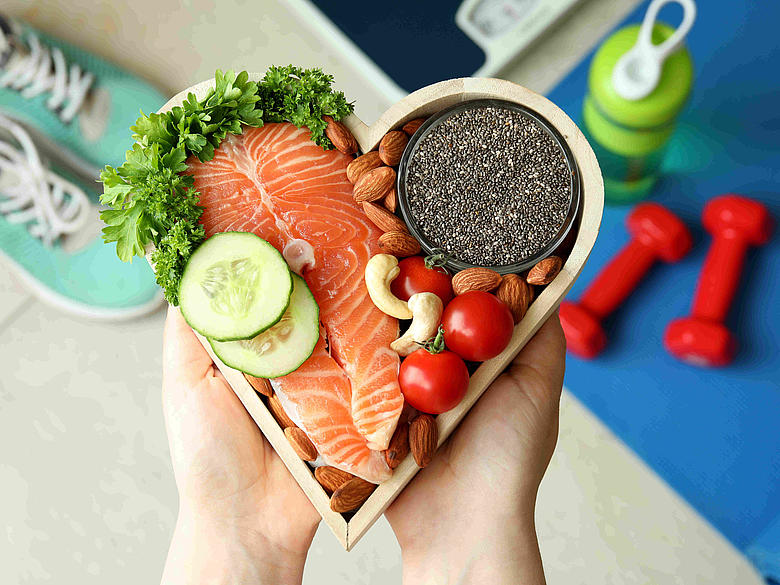As you may already know, 70% of your result is nutrition. With that said, it is important to ensure we are eating a balanced diet that looks after our overall health, especially including foods that are good for your health.
Did you know a poor diet is the main leading factor to Heart Disease in Australia? What we consume, through both eating and drinking, can have an impact on several factors that may put you at risk of Heart Disease. This includes:
- Blood Pressure
- Cholesterol
- Weight
- Type 2 Diabetes
What Food is Good for the Heart?
Firstly, let’s touch on what ‘Healthy Eating’ looks like. This can be a broad subject with varying opinions from numerous sources. In this article, we’re going to specifically look at the guidelines provided by the Australian Heart Foundation. A heart healthy diet should include:
- Fruit, Vegetables & Whole Grains
- Healthy Proteins
- Dairy
- Healthy Fats
- Herbs & Spice
Fruit, Vegetables and Whole Grains
A common phrase we like to use is to “Eat the Rainbow”. Fruit and vegetables are some of the best foods for heart health, but as you have probably guessed, Australians don’t eat enough of this food group. The importance of including 5 servings of fruit and vegetables over the day is to ensure we can get enough Vitamins and Minerals, fiber and antioxidants into our bodies, which have been shown to reduce our risk of heart disease.
Some examples of these foods for heart health include brown rice, multigrain bread, wholemeal pasta and wholegrain rolled oats. These foods are full of soluble fiber which becomes a thick gel in our intestine. This slows down digestion, stops blood sugar from spiking and traps fats so they can’t be absorbed.
Healthy Proteins
Not all protein sources are created equal and some proteins are definitely better foods for heart health. Including plant proteins such as chickpeas, lentils, nuts and seeds and Seafood like salmon and sardines are high in omega 3 which have been shown to reduce the amount of triglycerides (a type of fat) in your bloodstream. They also stop the build-up of plaque which is a substance of fat, cholesterol and calcium that hardens in your blood and blocks up your arteries.
Dairy
Foods that fall into this category include: milk, yogurt and cheese. These don’t necessarily lead to an increase or decrease in heart disease, but their importance cannot be understated as these provide an excellent source of calcium and protein. As a rule of thumb, you should also aim for unflavoured versions as these are generally low in added sugar. These best ones we have found include Yo-Pro by Danone and the Chobani Fit range, both readily available in Coles and Woolworths. If you do suffer from heart disease or high cholesterol we would recommend switching to reduced fat milk instead of the full fat alternatives.
Healthy Fats & Oils
Consuming too many ‘poor fats’ can increase your risk of developing heart disease. Saturated fat and trans fats are the main unhealthy fats and can raise the Non HDL cholesterol in our blood.We want to food that’s good for your heart, with monounsaturated fats (these have small amounts of good fat) like, almonds, cashews, olive oil and avocado. As well as foods that contain polyunsaturated fats such as salmon, mackerel and nuts (like walnuts and sunflower seeds) which supply Omega 3 and 6 that the body cannot produce on its own.
Herbs & Spices
Another part of our diet that can lead to an unhappy heart can be too much salt. A diet high in salt can disrupt the natural sodium balance in the body which causes fluid retention and in turn increase the pressure exerted by the blood against the blood vessel walls. Many people don’t realize most of the salt that they consume is found in processed and packaged food such as deli meat and baked foods. The best way to reduce salt is to ensure to follow the Australian Heart Foundation guidelines by eating a diet of unprocessed foods of fruit and vegetables and if you need to add flavor to your foods, do so by utilizing different herbs and spices.
If you're interested in improving your physical health through a combination of proper nutrition and exercise, Vision Personal Training can help. Our team of expert trainers can work with you to develop a personalized fitness plan that is tailored to your unique needs and goals. Whether you're just starting out on your fitness journey or looking to take your workouts to the next level, we're here to help. Contact us today for your complimentary consultation.

